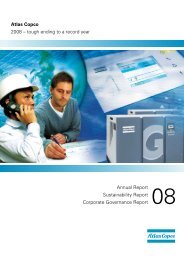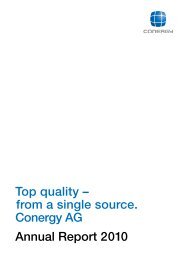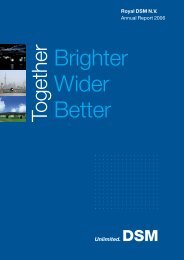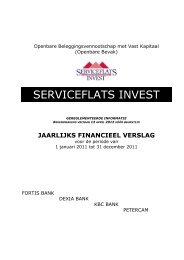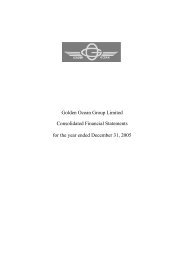sain t-gobain annu al report 2008 annual report
sain t-gobain annu al report 2008 annual report
sain t-gobain annu al report 2008 annual report
You also want an ePaper? Increase the reach of your titles
YUMPU automatically turns print PDFs into web optimized ePapers that Google loves.
72<br />
IV. V<strong>al</strong>ues supporting<br />
responsible growth<br />
Communicating Group v<strong>al</strong>ues<br />
Saint-Gobain’s response to the ch<strong>al</strong>lenges of sustainable<br />
development is rooted in the v<strong>al</strong>ues shared by <strong>al</strong>l<br />
our employees.<br />
These shared v<strong>al</strong>ues are enshrined in the Group Principles<br />
of Conduct and Action, which everyone in the corporate<br />
community is expected to apply.<br />
The Principles have been translated into more than<br />
30 languages and distributed to employees on every site<br />
in our 59 host countries.<br />
In addition, their importance was emphasized in a vast<br />
employee communication campaign deployed in 2007<br />
and <strong>2008</strong>, in particular with articles presenting points of view<br />
and best practices in the various countries.<br />
ARTICLE EMPHASISING<br />
THE PRINCIPLE OF LOYALTY<br />
The viewpoint of the S<strong>al</strong>es & Marketing Director,<br />
Saint-Gobain Hanglas China:<br />
“In my view, loy<strong>al</strong>ty is not an exception<strong>al</strong> qu<strong>al</strong>ity;<br />
it is the basis of profession<strong>al</strong>ism. Like <strong>al</strong>l company<br />
employees, I represent Saint-Gobain, and my main<br />
priority is to defend its interests. It is something that<br />
is constantly on my mind, and my commitment<br />
to Saint-Gobain is recognized in the same way as<br />
my profession<strong>al</strong> skills are.<br />
Source: The Month, June <strong>2008</strong>.<br />
Over the years, dedicated nation<strong>al</strong> and region<strong>al</strong> management<br />
seminars have been organized to present and explain<br />
the Principles, with the aim of gradu<strong>al</strong>ly covering<br />
<strong>al</strong>l of the host countries, particularly those deemed<br />
to be more “at risk.”<br />
The Responsible Development Department coordinates<br />
programs to ensure that the Principles underpin daily<br />
management practices. For example, the Principles are<br />
often referred to in many employment contracts,<br />
a practice that is currently being extended across<br />
the organization. The Human resources Department’s<br />
standardized performance review form, which is primarily<br />
intended for managers, includes a question on compliance<br />
with the Principles and their practic<strong>al</strong> application,<br />
while other corporate departments, such as Purchasing<br />
and Environment, He<strong>al</strong>th & Safety, have prepared charters<br />
adapting the Principles to address their specific issues.<br />
In addition, Delegations in the United States, India<br />
and other countries have drafted loc<strong>al</strong> charters<br />
extending the Principles in their region.<br />
Lastly, the Responsible Development Department participates<br />
in <strong>al</strong>l of the thirty management seminars organized every<br />
year by the Group Training Department. The Gener<strong>al</strong><br />
Delegations <strong>al</strong>so arrange targeted awareness-building<br />
initiatives for employees in their respective territories,<br />
in liaison with the Responsible Development Department.<br />
More effectively preventing business risks<br />
Compliance with competition law<br />
The effectiveness of our risk prevention mechanisms<br />
depends to a large extent on ensuring that management<br />
and employees embrace and strictly observe the Principles<br />
of Conduct and Action.<br />
As soon as it learned in March 2007 about the European<br />
Commission’s planned investigation of the construction<br />
glass business, the Group took vigorous action<br />
by implementing a Competition Plan designed to reinforce<br />
managers’ awareness of the need to comply with competition<br />
law. Clear rules have been introduced in every host country,<br />
benchmarked to European law whenever loc<strong>al</strong> legislation<br />
was too lax.<br />
Since then, the Competition Plan has been gradu<strong>al</strong>ly<br />
deployed across the Group by Group senior management:<br />
• More than 15,000 managers have attended the “Comply”<br />
e-learning course, which has been translated into<br />
12 languages.<br />
• More than 1,500 managers in eight countries have attended<br />
two to four-hour intensive courses with lawyers.<br />
• 48 unannounced audits have been performed, covering<br />
more than 200 people across <strong>al</strong>l Sectors in 13 countries.<br />
• In September <strong>2008</strong>, 23,000 managers received a copy<br />
of the Practic<strong>al</strong> Guide to Competition Compliance, which<br />
reviews competition rules, banned practices and the<br />
consequences of non-compliance. It has been translated into<br />
13 languages.<br />
Also in September, the Competition Plan’s initi<strong>al</strong> results<br />
were presented to the Group’s 150 top executives,<br />
to strengthen their support for compliance. At the same time,<br />
the executives decided to push the Comply e-learning course<br />
further down the management pyramid, pursue the intensive<br />
courses in every country, support compliance through<br />
unannounced audits and clearly affirm the principle<br />
of zero tolerance.<br />
Saint-Gobain - <strong>2008</strong> Annu<strong>al</strong> Report




